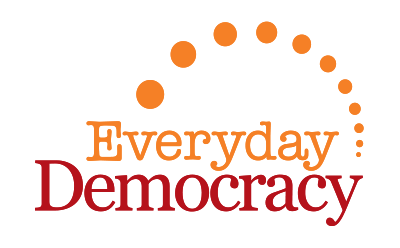About the 2024 Aicher Impact Award
In honor of Everyday Democracy’s founder, Paul J. Aicher, the annual Aicher Impact Award celebrates and supports the practice of inclusive, multiracial democracy. The two winners of the 2024 Aicher Impact Award are Hella Good Deeds and San Francisco Village. Each organization will receive a $5,000 cash prize, a physical award, and a digital badge for their website.
Finalists and Voting Information
Voting for the 2024 Aicher Impact Award has closed. The finalists were:
- Alliance for Felix Cove: The Alliance for Felix Cove works to protect, restore and rematriate the ancestral Coast Miwok/Tamalko homelands of the Felix Family at Point Reyes National Seashore in California.
- College Access for Non-Citizens: With operational hubs in NJ, NYC, and D.C., College Access for Non-Citizens champions the humanity, dignity, and civil rights of undocumented immigrants, actively working to reshape the criminalizing narrative around migration and to decolonize perspectives on education, borders, citizenship, and internationalism.
- Generation Common Good: Generation Common Good builds a future where everyone belongs and has the power to create long-term change in their communities. They believe our institutions can be reimagined and transformed to benefit all of us, our climate, and the common good.
- Hella Good Deeds: Hella Good Deeds is committed to elevating the presence of Asian culture in Kansas City by celebrating our heritage, amplifying our narrative, and connecting our community.
- San Francisco Village: San Francisco Village operationalizes love for elders in an ageist society by mobilizing the power of intergenerational relationships and mutual support.
Nominations Process
Any organization with 501(c)3 status in the United States and a budget under $2M will be eligible to be nominated. Nominees’ work should embody at least three of Everyday Democracy’s organizational values:
- Fostering relationships and active listening across differences with curiosity, respect, and appreciation for other’s perspectives.
- Building trust through transparency, communication, and accountability.
- Challenging dominant narratives to expand perspectives.
- Confronting structural oppression and inequitable systems to strengthen communities.
- Honoring local histories and embracing place-based strategies.
- Continuous learning through inquiry and practice.
